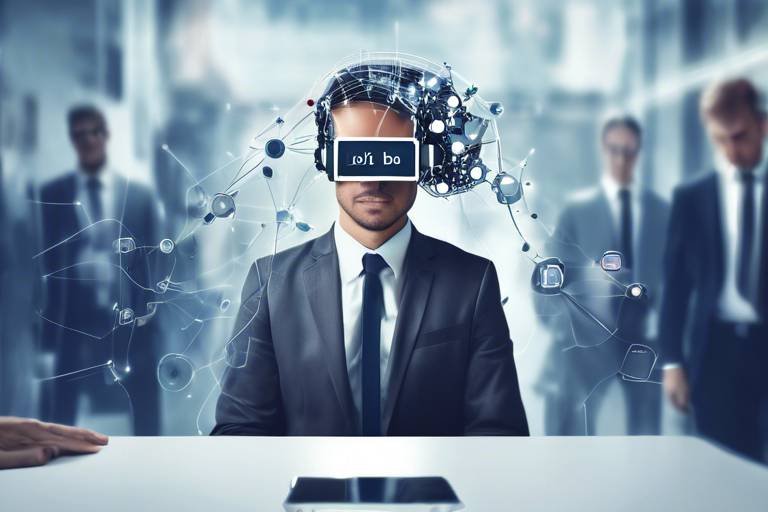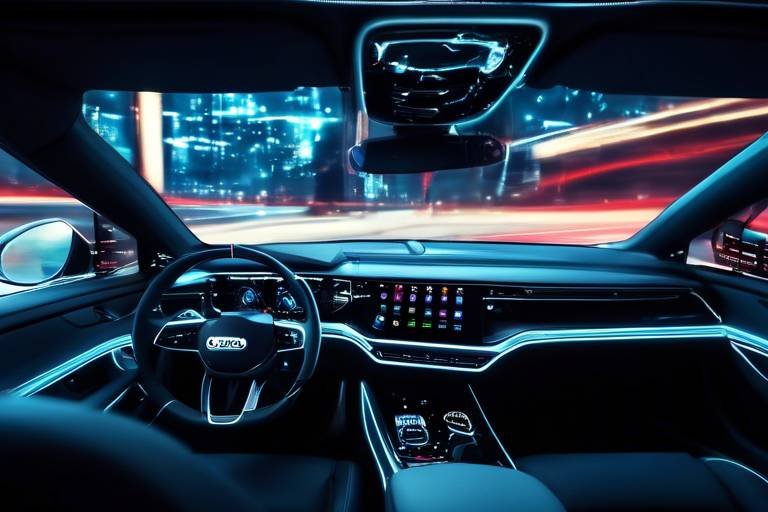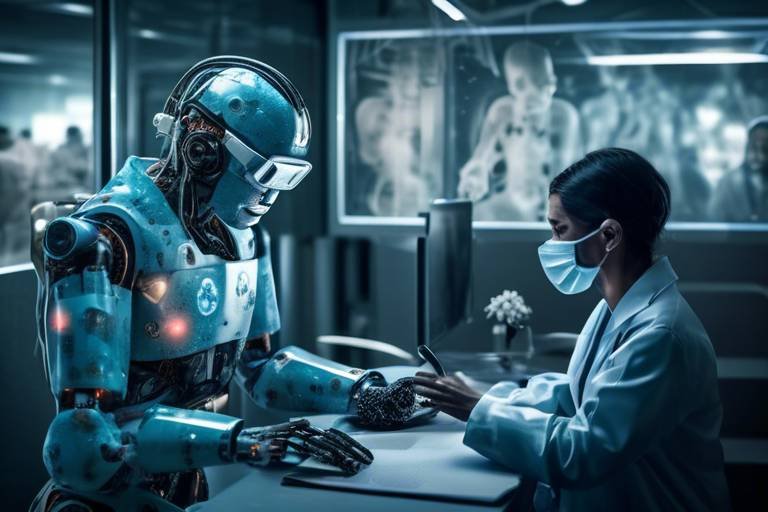AI and the Future of Job Search
In today’s fast-paced world, the job search landscape is undergoing a radical transformation, largely thanks to the advancements in artificial intelligence (AI). Gone are the days when job seekers had to rely solely on traditional methods like browsing job boards or submitting generic resumes. Now, with AI at the helm, both job seekers and employers are experiencing a revolution that enhances efficiency and effectiveness in the recruitment process. Imagine a world where algorithms sift through thousands of resumes in seconds, identifying the perfect match for a job description while offering tailored advice to candidates. This is not science fiction; it’s the reality we live in today.
AI is reshaping how we approach job searching, making it easier for applicants to connect with opportunities that suit their skills and aspirations. For employers, it means a more streamlined hiring process that allows them to focus on what truly matters: finding the right fit for their team. The implications of this technology are profound, as it not only enhances recruitment practices but also empowers job seekers to take control of their career paths.
As we delve deeper into this topic, we'll explore the various ways AI is influencing recruitment, the tools available for job seekers, and the ethical considerations that come into play. Whether you’re a job seeker looking to enhance your application or an employer aiming to refine your hiring process, understanding the role of AI in job searching is crucial. Are you ready to discover how AI is paving the way for the future of job search? Let’s dive in!
Artificial intelligence is revolutionizing the recruitment landscape by automating repetitive tasks that once consumed valuable time and resources. Tasks such as resume screening, candidate matching, and interview scheduling are now being handled by sophisticated algorithms. This shift allows recruiters to focus on more strategic decision-making, ensuring they can dedicate their efforts to building relationships and assessing cultural fit rather than getting bogged down in administrative duties.
For instance, AI can analyze a vast pool of resumes in a fraction of the time it would take a human recruiter. By utilizing machine learning algorithms, these systems can identify key skills and experiences that align with job requirements, thereby improving the quality of candidate shortlists. Additionally, AI can enhance the candidate experience by providing timely updates and feedback throughout the recruitment process, making it more engaging and transparent.
Job seekers are not left behind in this AI-driven landscape; they too can leverage technology to enhance their job search experience. AI tools are designed to assist candidates in various ways, from crafting tailored applications to receiving personalized job recommendations. Imagine having a virtual assistant that not only helps you polish your resume but also suggests roles that perfectly match your skill set. This level of personalization increases the likelihood of landing interviews and, ultimately, job offers.
One of the most exciting developments for job seekers is the emergence of AI-powered resume builders. These innovative tools guide candidates in creating customized resumes that resonate with specific job descriptions. By analyzing the requirements of a job posting, these builders help candidates highlight their most relevant skills and experiences effectively, enhancing their visibility to recruiters.
AI resume builders often come equipped with customization options, allowing users to tailor their resumes for different industries or roles. This feature is particularly beneficial for individuals transitioning between careers or those with diverse skill sets. By adjusting their resumes to align with the expectations of potential employers, candidates can significantly enhance their appeal.
Another powerful aspect of AI resume builders is their ability to perform keyword optimization. By analyzing job postings, these tools can suggest specific keywords and phrases that increase the chances of passing through Applicant Tracking Systems (ATS). This optimization is crucial, as many companies rely on these systems to filter out candidates before a human ever sees their application. With the right keywords, job seekers can ensure their resumes stand out in a crowded field.
AI-driven platforms are also revolutionizing how candidates prepare for interviews. By providing simulated interview experiences, these tools offer valuable feedback on performance, helping candidates refine their responses to common interview questions. This practice not only boosts confidence but also equips job seekers with the skills they need to impress potential employers.
As the influence of AI in hiring processes grows, so do the ethical concerns surrounding its use. Issues related to bias, transparency, and the potential for discrimination become increasingly important. It’s essential for companies to engage in ongoing discussions about responsible AI usage to ensure fair and equitable hiring practices.
Recognizing and mitigating biases in AI systems is crucial for promoting diversity and inclusion in the job market. If left unchecked, AI algorithms can perpetuate existing inequalities, disadvantaging certain groups of candidates. Companies must prioritize the development of AI technologies that are designed to promote fairness and reduce bias.
Furthermore, transparency in AI hiring practices is vital. Companies should strive to provide candidates with insights into how decisions are made, ensuring accountability for any adverse outcomes resulting from AI-driven processes. By fostering an environment of openness, organizations can build trust with candidates and promote a more inclusive hiring process.
- How does AI improve the job search process?
AI streamlines recruitment by automating tasks, providing personalized recommendations, and enhancing candidate preparation. - Are AI resume builders effective?
Yes, they help candidates tailor their resumes and optimize them for ATS, increasing their chances of being noticed by recruiters. - What ethical concerns are associated with AI in recruitment?
Concerns include bias in algorithms, transparency in decision-making, and the potential for discrimination.

The Role of AI in Recruitment
In today’s fast-paced world, the recruitment landscape is evolving at an unprecedented rate, and at the forefront of this transformation is artificial intelligence (AI). AI is not just a buzzword; it’s a game changer that is reshaping how companies find and hire talent. Imagine a world where tedious tasks like resume screening and interview scheduling are handled by intelligent systems, freeing up recruiters to focus on what truly matters—building relationships and making strategic decisions. This is the reality that AI brings to the table.
One of the most significant advantages of AI in recruitment is its ability to streamline the hiring process. Traditional recruitment methods often involve sifting through hundreds, if not thousands, of resumes. This can be a daunting and time-consuming task. However, with AI-powered tools, the initial screening process can be automated, allowing recruiters to quickly identify candidates who meet the necessary qualifications. This not only speeds up the hiring process but also reduces the risk of human error, ensuring that no qualified candidate is overlooked.
Furthermore, AI enhances candidate matching through advanced algorithms that analyze both job descriptions and candidate profiles. These algorithms can assess a multitude of factors, including skills, experience, and even cultural fit, to deliver a shortlist of the most suitable candidates. This means that recruiters can spend less time on administrative tasks and more time engaging with potential hires, ultimately leading to better hiring decisions.
Another area where AI shines is in interview scheduling. Coordinating interviews can often feel like a logistical nightmare, with back-and-forth emails and calendar conflicts. AI tools can automate this process by integrating with calendars and suggesting optimal times for both candidates and interviewers. This not only saves time but also enhances the candidate experience, making it easier for them to engage with the company.
However, the role of AI in recruitment goes beyond mere automation. It also provides valuable insights through data analytics. Recruiters can leverage AI to analyze past hiring trends, understand candidate behaviors, and refine their recruitment strategies. For instance, by examining which sources yield the best candidates, companies can optimize their talent acquisition efforts and invest their resources more effectively.
To sum it up, the integration of AI into recruitment processes is not just a trend; it’s a fundamental shift that brings efficiency, accuracy, and strategic insight. Companies that embrace AI technology can not only enhance their hiring processes but also gain a competitive edge in the quest for top talent. As we move forward, it’s clear that AI will continue to play a pivotal role in shaping the future of recruitment.
- How does AI improve the recruitment process? AI automates repetitive tasks, enhances candidate matching, and provides data-driven insights, allowing recruiters to focus on strategic decision-making.
- Are there any downsides to using AI in recruitment? While AI offers many benefits, it can also introduce biases if not properly managed, necessitating careful oversight and ethical considerations.
- Can AI replace human recruiters? No, AI is designed to assist human recruiters, not replace them. The human touch is still crucial in building relationships and understanding candidate nuances.

Impact on Job Seekers
In today's fast-paced job market, the influence of artificial intelligence (AI) on job seekers is nothing short of revolutionary. Imagine having a personal assistant that not only understands your career aspirations but also helps you navigate the complex landscape of job applications. With AI tools at their fingertips, job seekers can now enhance their applications, receive tailored job recommendations, and prepare for interviews like never before. This transformation is akin to having a secret weapon in your job search arsenal, making the process not only more efficient but also more effective.
One of the most significant advantages of AI for job seekers is the ability to leverage AI-powered resume builders. These innovative tools assist candidates in crafting resumes that are specifically tailored to align with job descriptions. Think of it as having a personal coach who knows exactly what recruiters are looking for. By highlighting relevant skills and experiences, candidates can significantly improve their visibility to potential employers. The days of generic resumes that blend into the background are fading away, replaced by customized documents that catch the eye.
AI resume builders come packed with features designed to help job seekers stand out. One of the key aspects is their customization features. These options allow users to adjust their resumes for specific industries or roles. For instance, if you're applying for a tech position, you can emphasize your software skills, while for a marketing role, you can showcase your creative projects. This level of personalization ensures that your resume resonates with the hiring manager, making it more appealing.
Moreover, these tools often incorporate keyword optimization capabilities. By analyzing job postings, AI can suggest essential keywords and phrases that boost the chances of passing through Applicant Tracking Systems (ATS). This is crucial because many companies use ATS to filter resumes before they even reach human eyes. By integrating the right keywords, your resume becomes more competitive, increasing your chances of landing that coveted interview.
But the benefits of AI don't stop at resumes. Job seekers can also take advantage of AI-driven interview preparation tools. Imagine being able to practice for an interview in a simulated environment that mimics real-life scenarios. These platforms provide candidates with feedback on their performance, helping them refine their responses to common interview questions. It's like having a mentor who guides you through the nuances of interview techniques, boosting your confidence and readiness.
In addition, AI tools can analyze your responses, suggesting areas for improvement. This feedback loop is invaluable, as it allows you to hone your interview skills and approach each opportunity with greater assurance. With the right preparation, candidates can walk into interviews feeling more equipped to impress potential employers, making the job search journey less daunting.
In summary, the impact of AI on job seekers is profound and multifaceted. From crafting tailored resumes to preparing for interviews, these technologies empower candidates to take control of their job search. As the landscape continues to evolve, embracing these tools can make all the difference in landing your dream job.
- How can AI improve my resume?
AI tools can help tailor your resume to specific job descriptions, suggest relevant keywords, and enhance overall presentation. - What are the benefits of using AI for interview preparation?
AI platforms provide simulated interview experiences, offer feedback, and help you improve your responses. - Are AI resume builders easy to use?
Yes, most AI resume builders are user-friendly and guide you through the process of creating a professional resume. - Can AI tools help me find job openings?
Absolutely! Many AI tools can analyze your skills and preferences to recommend job openings that match your profile.

AI-Powered Resume Builders
In today’s competitive job market, standing out is more important than ever, and this is where can make a significant difference. These innovative tools are designed to help job seekers create resumes that not only catch the eye of recruiters but also align perfectly with the requirements of specific job postings. Imagine having a personal assistant that knows exactly what employers are looking for and helps you craft a resume that showcases your strengths in the best light possible. Sounds like a dream, right? Well, it's now a reality!
One of the most remarkable features of AI-powered resume builders is their ability to analyze job descriptions. By utilizing advanced algorithms, these tools can identify the key skills and qualifications that employers prioritize. This means that when you input your information, the AI can suggest modifications that will enhance your resume's appeal. For instance, if a job listing emphasizes "project management" and "team leadership," the resume builder can prompt you to highlight relevant experiences that demonstrate these competencies. This tailored approach not only increases your chances of getting noticed but also ensures that your resume is customized for the job you're applying for.
Moreover, many AI resume builders come equipped with customization features that allow users to tweak their resumes for different industries or roles. This flexibility is vital because different fields may require distinct formats or styles. For example, a creative role might benefit from a visually appealing design, while a corporate position may call for a more traditional layout. By having the ability to adjust your resume according to the job type, you can present yourself as the ideal candidate for each opportunity.
Another critical aspect of AI resume builders is keyword optimization. These tools can scan job postings and recommend specific keywords and phrases that are likely to resonate with Applicant Tracking Systems (ATS). ATS are software applications that employers use to filter resumes before they even reach human eyes. By incorporating the right keywords, you can significantly improve your chances of passing through this initial screening process. Imagine your resume landing directly in the hands of a recruiter instead of getting lost in the digital abyss—this is the power of keyword optimization!
In addition to these features, AI-powered resume builders often provide real-time feedback. This means that as you work on your resume, the tool can offer suggestions to improve clarity, grammar, and overall presentation. Think of it as having a knowledgeable friend who is always ready to help you polish your document until it shines. With such comprehensive support, job seekers can feel more confident in their applications, knowing they have utilized cutting-edge technology to enhance their chances of success.
In conclusion, AI-powered resume builders are revolutionizing the way job seekers approach their applications. By leveraging the power of artificial intelligence, candidates can create resumes that are not only visually appealing but also strategically aligned with job requirements. As the job market continues to evolve, embracing these tools can provide a significant advantage, making the difference between landing an interview and being overlooked.
- What is an AI-powered resume builder? An AI-powered resume builder is a tool that uses artificial intelligence to help users create optimized resumes tailored to specific job postings.
- How does keyword optimization work? Keyword optimization involves analyzing job descriptions to identify key terms that should be included in your resume to improve its chances of passing through Applicant Tracking Systems.
- Can I customize my resume for different jobs? Yes, most AI resume builders offer customization options that allow you to adjust your resume for various industries or roles.
- Is it easy to use an AI-powered resume builder? Absolutely! These tools are designed to be user-friendly, guiding you through the resume creation process step by step.

Customization Features
When it comes to job hunting, a one-size-fits-all approach rarely works. That's where AI-powered resume builders shine, offering that enable candidates to tailor their resumes for specific roles or industries. Imagine trying to fit into a pair of shoes that are two sizes too small; it just doesn’t work! Similarly, a generic resume can hinder your chances of standing out in a competitive job market.
These tools allow users to adjust various aspects of their resumes, ensuring that they resonate with the expectations of potential employers. For instance, candidates can modify their professional summaries, highlight relevant experiences, and even tweak the language used to align with the job description. By doing so, they create a compelling narrative that speaks directly to what hiring managers are seeking.
Moreover, many AI resume builders come equipped with intuitive interfaces that guide users through the customization process. This means you don't have to be a tech wizard to create an eye-catching resume. Features such as drag-and-drop functionality and pre-designed templates make it easy to craft a document that not only looks good but also effectively communicates your skills and experiences. Think of it as having a personal stylist for your career journey!
Additionally, these tools often provide real-time feedback on how well your resume aligns with the job description. This feedback can be invaluable, as it allows candidates to make informed adjustments that increase their chances of getting noticed. For example, if a job posting emphasizes the need for teamwork skills, the AI tool might suggest incorporating specific examples of past collaborative projects. This level of personalization ensures that your resume isn’t just a list of duties but a tailored showcase of your qualifications.
In essence, the customization features of AI resume builders empower job seekers to present their best selves. By leveraging these advanced tools, candidates can transform their resumes from standard documents into powerful marketing tools that highlight their unique value propositions. As the job market continues to evolve, embracing these features can make all the difference in landing that dream job.
- What is an AI-powered resume builder?
An AI-powered resume builder is a digital tool that uses artificial intelligence to help job seekers create customized and optimized resumes tailored to specific job applications.
- How can I ensure my resume stands out?
Utilizing customization features in AI resume builders allows you to align your resume with job descriptions, highlight relevant skills, and incorporate industry-specific keywords, significantly improving your visibility to recruiters.
- Are AI resume builders user-friendly?
Yes! Most AI resume builders are designed with user-friendly interfaces, making them accessible even for those who may not be tech-savvy.
- Can AI help with interview preparation?
Absolutely! Many AI platforms offer simulated interviews and feedback, helping candidates improve their performance and boost their confidence.

Keyword Optimization
In today’s competitive job market, standing out from the crowd is more crucial than ever, and plays a pivotal role in helping job seekers achieve that goal. Imagine sending out dozens of resumes only to hear crickets in response; it’s frustrating, right? Well, AI-powered tools are here to turn that silence into a symphony of job offers! By analyzing job postings, these tools can pinpoint the essential keywords and phrases that recruiters are looking for, allowing candidates to tailor their resumes effectively.
When it comes to crafting a resume that catches the eye of recruiters, it’s all about using the right language. Think of your resume as a billboard on a busy highway—if you don’t have the right keywords, you’re simply going to blend in with the background. AI tools can help identify these critical terms, ensuring your resume doesn’t just get noticed but also resonates with hiring managers. For instance, if a job description emphasizes skills like “project management” or “data analysis,” incorporating these phrases into your resume can significantly enhance your visibility.
Moreover, AI tools often provide insights into the frequency and context in which these keywords appear in successful resumes. This means you’re not just throwing in random terms; you’re strategically placing them where they matter most. By understanding how to weave these keywords into your professional narrative, you can create a compelling story that showcases your qualifications and aligns perfectly with the job requirements.
To illustrate the importance of keyword optimization, consider the following table that outlines common keywords for various industries:
| Industry | Common Keywords |
|---|---|
| Technology | Software Development, Agile, Cloud Computing |
| Marketing | SEO, Content Strategy, Digital Marketing |
| Healthcare | Patient Care, Medical Terminology, HIPAA Compliance |
| Finance | Financial Analysis, Risk Management, Investment Strategies |
By leveraging the power of AI for keyword optimization, job seekers can not only enhance their resumes but also improve their chances of passing through Applicant Tracking Systems (ATS). These systems are designed to filter out resumes that don’t contain the right keywords, so if your resume doesn’t make the cut, it might never even reach a human recruiter. In essence, keyword optimization isn’t just a helpful tip; it’s a vital strategy for success in the job search journey.
In conclusion, embracing AI-driven keyword optimization tools can transform your job application process from a tedious task into a streamlined experience. By understanding the significance of keywords and utilizing them effectively, you’re not just applying for jobs; you’re strategically positioning yourself as the ideal candidate. So, why not give it a try? Your dream job could be just a keyword away!
- What is keyword optimization? Keyword optimization is the process of incorporating relevant keywords into your resume and job applications to improve visibility and increase the chances of being noticed by recruiters.
- How can AI tools help with keyword optimization? AI tools analyze job descriptions to identify essential keywords, suggesting ways to incorporate them effectively into your resume.
- Why is keyword optimization important? It enhances your chances of passing through Applicant Tracking Systems (ATS) and helps your resume stand out to hiring managers.
- Can I overuse keywords in my resume? Yes, overusing keywords can lead to a resume that feels unnatural or forced. It's essential to integrate them smoothly into your narrative.

Interview Preparation Tools
In today's fast-paced job market, standing out during the interview process is crucial for job seekers. AI-driven interview preparation tools are revolutionizing the way candidates prepare for interviews, making it easier and more efficient to hone their skills. Imagine having a personal coach available 24/7, ready to help you tackle those nerve-wracking questions and boost your confidence. That's precisely what these tools offer! By simulating real interview scenarios, they provide invaluable feedback that can make a significant difference in a candidate's performance.
These platforms often utilize advanced algorithms to analyze your responses, giving you insights into your body language, tone of voice, and even the content of your answers. This means that you can receive tailored advice on how to improve, ensuring that you present your best self when it matters most. For instance, if you're too formal or too casual in your responses, the tool will highlight this and suggest adjustments. Ultimately, this level of preparation can be the key to landing your dream job.
Moreover, many of these tools come equipped with a library of common interview questions, allowing you to practice a wide range of scenarios. This feature can be particularly beneficial for those who may not know what to expect during the interview process. But it doesn’t stop there! Some platforms even offer industry-specific questions, ensuring that you're well-prepared for the nuances of your desired field. Think of it as getting a sneak peek into the interviewer's mind, giving you a competitive edge over other candidates.
To illustrate the effectiveness of these tools, consider the following table showcasing the features of popular AI interview preparation platforms:
| Platform | Key Features | Industry Focus |
|---|---|---|
| InterviewBuddy | Real-time feedback, video simulations, expert advice | General |
| Pramp | Peer interviews, practice sessions, feedback loops | Tech, Finance |
| HireVue | AI analysis, question library, performance tracking | Healthcare, Education |
As you can see, each platform offers unique features tailored to different needs and industries. The beauty of these tools lies in their adaptability; whether you're preparing for a tech interview or stepping into a healthcare role, there's something out there for everyone. So why not take advantage of these innovative tools? With the right preparation, you can walk into your next interview feeling confident and ready to impress.
- How do AI interview preparation tools work? They simulate interview scenarios and provide feedback on your responses, helping you improve your performance.
- Are these tools suitable for all job seekers? Yes! They cater to various industries and skill levels, making them beneficial for everyone.
- Can I practice specific industry-related questions? Absolutely! Many platforms offer tailored questions based on the industry you're targeting.
- Do I need any special equipment to use these tools? Most tools are web-based, requiring only a computer and a camera for video simulations.

Ethical Considerations in AI Recruitment
As artificial intelligence continues to revolutionize the recruitment landscape, it brings with it a set of ethical considerations that cannot be overlooked. The use of AI in hiring processes has the potential to streamline operations and improve efficiency, but it also raises critical questions about fairness, transparency, and accountability. In an era where technology can make decisions that significantly impact people's lives, we must ask ourselves: are we using AI responsibly?
One of the primary concerns surrounding AI in recruitment is the risk of bias. Algorithms are only as good as the data they are trained on, and if that data reflects historical inequalities, the AI can inadvertently perpetuate them. For instance, if an AI system is trained on resumes from a predominantly male workforce, it might favor male candidates over equally qualified female candidates. This not only undermines the principles of diversity and inclusion but also limits the talent pool for employers. Therefore, it is crucial for companies to actively work on addressing bias in their AI algorithms.
To tackle these biases, organizations can implement several strategies:
- Regular Audits: Conduct frequent assessments of AI systems to identify and rectify any biases that may arise.
- Diverse Data Sets: Ensure that the training data includes a wide range of demographic backgrounds to promote fairness.
- Human Oversight: Incorporate human judgment in the final hiring decisions to balance AI recommendations.
Another ethical consideration is transparency. Candidates often feel uneasy when they do not understand how hiring decisions are made. If an AI system rejects an applicant without clear reasoning, it can lead to feelings of frustration and mistrust. Companies need to prioritize transparency in their AI hiring practices. This means providing candidates with insights into how AI tools assess applications and what criteria are used to make decisions. By doing so, organizations can foster a sense of trust and accountability, which is essential for maintaining a positive employer brand.
Moreover, accountability plays a critical role in the ethical use of AI in recruitment. If an AI system leads to adverse outcomes, such as discrimination against certain groups of candidates, companies must take responsibility for those decisions. Establishing clear policies and procedures for addressing grievances related to AI-driven hiring can help mitigate the risks associated with technological errors. Organizations should not only be prepared to address issues as they arise but also proactively work to prevent them by implementing robust governance frameworks.
In summary, while AI has the potential to transform recruitment processes for the better, it is imperative for organizations to navigate the ethical landscape carefully. By addressing bias, ensuring transparency, and establishing accountability, companies can harness the power of AI responsibly. As we move forward, ongoing discussions about the implications of AI in hiring will be crucial in shaping a fair and equitable job market for all.
Q1: How can bias in AI recruitment be identified?
A1: Bias can be identified through regular audits of AI systems and analyzing hiring patterns to see if certain groups are consistently disadvantaged.
Q2: What steps can companies take to ensure transparency in AI hiring?
A2: Companies can provide clear documentation on how AI tools work, what data they use, and how decisions are made, allowing candidates to understand the recruitment process better.
Q3: Why is human oversight important in AI recruitment?
A3: Human oversight is essential to balance AI recommendations and ensure that decisions consider the nuances of individual candidates that algorithms may overlook.

Addressing Bias in AI Algorithms
As we dive deeper into the world of artificial intelligence in recruitment, one pressing issue that cannot be overlooked is the potential for bias in AI algorithms. You see, AI systems are only as good as the data fed into them. If that data reflects existing societal biases, the AI will likely replicate those biases in its decision-making processes. This is a critical concern, especially in a hiring context where fairness and equality are paramount. So, how do we tackle this issue?
First and foremost, it's essential to recognize that bias can manifest in various forms. For instance, if an AI system is trained on historical hiring data that favors a particular demographic, it may inadvertently favor candidates from that group in future selections. This not only undermines the principles of diversity and inclusion but also limits the pool of talent that organizations can draw from. To combat this, companies must actively work to ensure that their training data is representative and diverse.
Moreover, implementing regular audits of AI algorithms is crucial. These audits can help identify any patterns of bias that may emerge over time. By analyzing the outcomes of AI-driven recruitment processes, organizations can pinpoint areas where bias may be influencing decisions. This is where transparency plays a vital role. Candidates should have access to information about how AI systems operate and the criteria used for evaluations. This transparency fosters trust and allows for accountability.
Another effective strategy is to involve a diverse group of stakeholders in the development and deployment of AI systems. By including voices from various backgrounds—such as different genders, ethnicities, and experiences—companies can gain valuable insights that help create more equitable AI solutions. Collaboration with external experts in ethics and AI can also provide a broader perspective on potential biases and how to mitigate them.
To illustrate the importance of addressing bias, consider the following table that outlines common types of bias found in AI recruitment systems:
| Type of Bias | Description |
|---|---|
| Data Bias | Occurs when the training data is not representative of the entire population, leading to skewed outcomes. |
| Algorithmic Bias | Results from the design of the algorithm itself, which may favor certain attributes over others. |
| Human Bias | Reflects the biases of those who create or train the AI systems, which can inadvertently influence the AI's decisions. |
In conclusion, addressing bias in AI algorithms is not just a technical challenge; it is a moral imperative. By prioritizing diversity in data, conducting regular audits, ensuring transparency, and fostering inclusive development practices, organizations can create AI systems that not only enhance recruitment efficiency but also promote fairness and equality in the job market. After all, the goal should be to harness the power of AI to create opportunities for everyone, not to perpetuate existing disparities.
- What is AI bias? AI bias refers to the tendency of AI systems to produce prejudiced results due to flawed training data or algorithm design.
- How can companies reduce bias in AI recruitment? Companies can reduce bias by using diverse training data, conducting audits, and ensuring transparency in AI processes.
- Why is transparency important in AI hiring? Transparency helps candidates understand how decisions are made, fostering trust and accountability in the recruitment process.

Transparency and Accountability
In the rapidly evolving landscape of AI recruitment, transparency and accountability are not just buzzwords; they are essential pillars that uphold the integrity of the hiring process. As artificial intelligence systems increasingly influence who gets hired and who doesn't, candidates deserve to understand how these technologies work and the criteria upon which decisions are made. Imagine applying for a job only to find out that an algorithm, rather than a human, determined your fate based on obscure metrics that you had no chance of influencing. This scenario highlights the pressing need for companies to prioritize transparency in their AI hiring practices.
To foster trust and fairness in recruitment, organizations must openly communicate the methodologies behind their AI systems. This includes providing insights into the data sets used to train these algorithms, as well as the specific factors that influence candidate evaluations. For instance, if an AI tool is designed to prioritize certain qualifications or experiences, candidates should be made aware of these priorities upfront. This not only empowers job seekers but also encourages them to tailor their applications more effectively, increasing their chances of success.
Moreover, accountability is crucial in ensuring that AI-driven recruitment processes do not lead to unintended consequences, such as discrimination or bias. Companies must establish clear guidelines for monitoring AI outcomes and take responsibility for any adverse effects that arise. This might involve regular audits of AI performance to identify any patterns of bias that could disadvantage specific groups. By being proactive in addressing these issues, organizations can demonstrate their commitment to ethical hiring practices.
To illustrate the importance of transparency and accountability in AI recruitment, consider the following table that outlines key components:
| Component | Description |
|---|---|
| Data Transparency | Informing candidates about the data used to train AI algorithms. |
| Criteria Disclosure | Clearly stating the factors that influence candidate evaluations. |
| Regular Audits | Conducting routine checks to identify and mitigate biases. |
| Feedback Mechanisms | Providing candidates with insights on their application outcomes. |
In conclusion, transparency and accountability in AI recruitment are not merely ethical considerations; they are vital for fostering a fair and equitable job market. As we move forward, both employers and job seekers must advocate for practices that ensure AI technologies enhance, rather than hinder, the recruitment process. By demanding clear communication and accountability, we can create a hiring landscape that is not only efficient but also just.
- What is AI recruitment? AI recruitment refers to the use of artificial intelligence technologies to streamline and improve the hiring process, including tasks like resume screening and candidate matching.
- How does transparency impact job seekers? Transparency allows job seekers to understand how their applications are evaluated, enabling them to tailor their resumes and prepare more effectively for interviews.
- What are the ethical concerns surrounding AI in recruitment? Ethical concerns include potential biases in AI algorithms, lack of transparency in decision-making, and the risk of discrimination against certain groups.
- How can companies ensure accountability in AI hiring? Companies can ensure accountability by conducting regular audits of their AI systems, monitoring outcomes for bias, and establishing clear guidelines for ethical use.
Frequently Asked Questions
- How is AI changing the job search process?
AI is revolutionizing the job search process by automating tasks like resume screening and candidate matching. This means recruiters can spend less time on mundane tasks and more on strategic decision-making, ultimately enhancing the efficiency of hiring processes.
- What are AI-powered resume builders?
AI-powered resume builders are tools that help job seekers create tailored resumes that align with job descriptions. They analyze job postings to suggest relevant keywords and phrases, boosting visibility to recruiters and ensuring that candidates highlight their most pertinent skills.
- Can AI help me prepare for interviews?
Absolutely! AI-driven platforms offer simulated interview experiences, allowing candidates to practice their responses to common questions. These tools provide valuable feedback, helping you improve your performance and increase your chances of impressing potential employers.
- What ethical concerns are associated with AI in recruitment?
As AI becomes more integrated into hiring processes, concerns about bias, transparency, and discrimination arise. It's crucial for companies to address these issues, ensuring that their AI systems promote diversity and inclusion rather than reinforcing existing inequalities.
- How can companies address bias in AI recruitment?
Companies can address bias in AI by regularly auditing their algorithms and ensuring diverse datasets are used in training. This helps to mitigate the risk of perpetuating biases and ensures that recruitment technologies are fair and equitable.
- Why is transparency important in AI hiring practices?
Transparency is vital because it allows candidates to understand how hiring decisions are made. When companies are open about their AI processes, it fosters trust and accountability, ensuring that candidates feel respected and valued throughout the hiring journey.



















